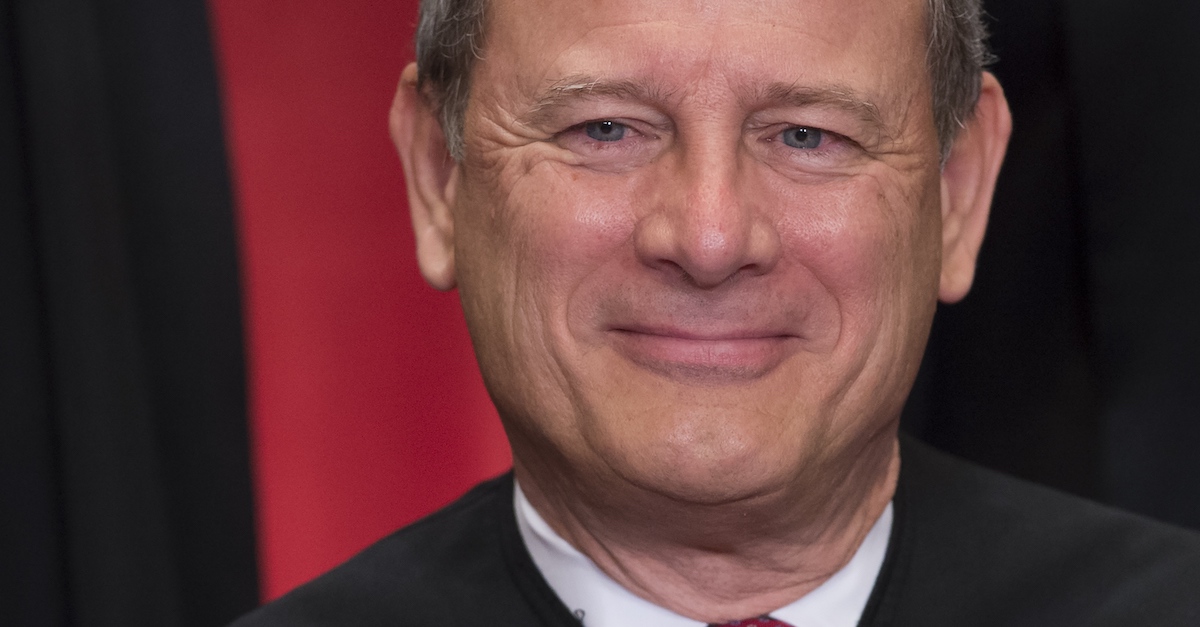
Chief Justice of the United States John G. Roberts
On New Year’s Eve, Chief Justice of the Supreme Court John Roberts released his year-end report for 2022 that was almost as notable for what it left out as what it said.
In the report, which is released every year as the Supreme Court’s answer to the State of the Union, Roberts focused heavily on the importance of judicial security — but he said exactly nothing about the biggest security scandal in recent high court history.
Roberts began with a history lesson about the Little Rock Nine, the group of African American children who were the first to attend a formerly segregated school after the 1954 decision in Brown v. Board of Education. Though Roberts briefly name-checked Wiley Branton (the lawyer for the nine and dean of Howard University School of Law) and Thurgood Marshall (who argued the Brown case and later became the first African American justice on the Supreme Court), he focused primarily on a far lesser-known figure: U.S. District Judge Ronald Davies.
Davies, a former U.S. Capitol police officer, was born in Minnesota and raised in North Dakota before he was appointed to the federal bench by President Dwight D. Eisenhower. Two years into Davies’ tenure as a judge, he was tapped to fill in for another judge who had fallen ill. And so, it was that Davies found himself presiding over post-desegregation litigation in Arkansas.
Despite the social upheaval surrounding school desegregation, Roberts explained that Davies remained a stalwart guardian of the Constitution who would characterize the law underlying his decisions as “very clear.”
Roberts quoted Davies: “In an organized society, there can be nothing but ultimate confusion and chaos if court decrees are flaunted.”
Roberts offered some words of his own about the role of court decrees. “Judicial opinions speak for themselves, and there is no obligation in our free country to agree with them,” the chief justice said.
During the 1950s. thousands of national guardsmen and the “Screaming Eagles” of 101 Airborne protected the desegregated schools, Davies and his family faced their own serious threats of personal violence. With Davies’ experience as a backdrop, Roberts thanked Members of Congress for funding judicial security needs, adding that security programs “are essential to run a system of courts.”
To underscore the timelessness of his point, Roberts mentioned U.S. District Judge Esther Salas, whose son Daniel Anderl was murdered in 2020 by a self-proclaimed men’s rights activist that had been targeting the judge. Roberts praised federal lawmakers for enacting the Daniel Anderl Judicial Security and Privacy Act to help protect judges and their families.
“A judicial system cannot and should not live in fear,” demanded Roberts.
The chief justice ended his statement with words of gratitude for the U.S. Marshals, Court Security Officers, Federal Protective Service Officers, Supreme Court Police Officers who protect the members of the Court.
The remainder of Roberts’ report included statistics and charts relating to the federal judiciary and its cases. Notably, 2022 saw an eight percent decline in cases filed with the Supreme Court, which was in line with a similar fall across the entire federal judiciary — and included a 20 percent decrease in new civil cases filed in district courts.
Roberts’ focus on judicial security was unsurprising given many events of the past year. Justice Brett Kavanaugh was forced to leave a restaurant while dining, received threats of murder, and was the target of an attempted assassination. Justice Samuel Alito also reported receiving harassing packages at his former home. These incidents occurred not long after the Supreme Court issued its decision overruling Roe v. Wade in Dobbs v. Jackson Women’s Health Organization.
Conspicuously absent, however, was any mention to the most significant non-violent security failure in modern SCOTUS history: the leak of a draft Dobbs decision. In May 2022, weeks before the Court’s ruling in Dobbs was handed down, a draft opinion authored by Justice Alito was leaked to the press. Ultimately, the final opinion released was substantially similar to the leaked draft.
In the wake of what Chief Justice Roberts called an “absolutely appalling” breach of confidentiality, Roberts directed the Court’s Marshal to investigate the source and vowed that the culprit would be found. At the head of the investigation is Gail Curley, the former U.S. Army colonel who serves as the Court’s chief security officer, facilities administrator, and manager of the Supreme Court Police Force. Curley, only the second woman to serve as the marshal, is the person who can be heard on the SCOTUS livestream calling the proceedings to order before each oral argument with, “Oyez! Oyez! Oyez!… God save the United States and this honorable court.”
More than half a year later, though, the public has received no official update and no source of the leak has been named.
You can read the full 2022 report here.
[image via Saul Loeb/AFP via Getty Images]